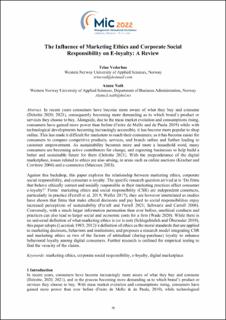| dc.description.abstract | In recent years consumers have become more aware of what they buy and consume (Deloitte 2020; 2021), consequently becoming more demanding as to which brand’s product or services they choose to buy. Alongside, due to the mass market evolution and consumptions rising, consumers have gained more power than before (Freire de Mello and de Paula 2019) while with technological developments becoming increasingly accessible, it has become more popular to shop online. This has made it difficult for marketers to reach their consumers; as it has become easier for consumers to compare competitive products, services, and brands online and further leading to customer empowerment. As sustainability becomes more and more a household word, many consumers are becoming active contributors for change, and expecting businesses to help build a better and sustainable future for them (Deloitte 2021). With the preponderance of the digital marketplace, issues related to ethics are also arising, in areas such as online auctions (Kracher and Corritore 2004) and e-commerce (Marcoux 2003). Against this backdrop, this paper explores the relationship between marketing ethics, corporate social responsibility, and consumer e-loyalty. The specific research question arrived at is ‘Do firms that behave ethically correct and socially responsible in their marketing practices affect consumer e-loyalty?’ Firms’ marketing ethics and social responsibility (CSR) are independent constructs, particularly in practice (Ferrell et al. 2019; Weller 2017); they are however interrelated as studies have shown that firms that make ethical decisions and pay heed to social responsibilities enjoy increased perceptions of sustainability (Ferrell and Ferrell 2021; Schwartz and Carroll 2008). Conversely, with a much larger information permeation than ever before, unethical conducts and practices can also lead to larger social and economic costs for a firm (Wade 2020). While there is no universal definition of what marketing ethics is (or is not) (Schlegelmilch and Öberseder 2010), this paper adopts (Laczniak 1983; 2012)’s definition of ethics as the moral standards that are applied to marketing decisions, behaviors and institutions; and proposes a research model integrating CSR and marketing ethics as two of the factors of attitudinal (during-purchase) loyalty to enhance behavioral loyalty among digital consumers. Further research is outlined for empirical testing to find the veracity of the claims. | en_US |

